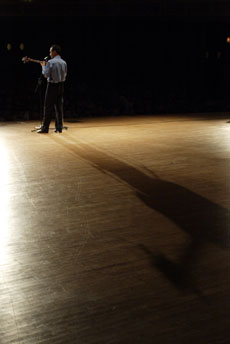University celebrates harvest at Moon Festival
September 27, 2004
More than 1,000 Chinese students, children and University staff came together to celebrate the Chinese Moon Festival Saturday night.
The event was hosted by the Chinese Students and Scholars Association (CSSA) and took place in Foellinger Auditorium. For three hours, guests celebrated the Moon Festival with group singing, dancing and other performances.
The Moon Festival, also called the Mid-Autumn or Autumn Moon Festival, celebrates the Chinese harvest and is considered the second most important holiday in China, behind the Chinese New Year. It takes place on the 15th day of the eighth month on the lunar calendar, meaning the exact date varies from year to year based on the phases of the moon. The festival typically falls in August or September of the solar calendar.
The festival is commonly known for the ancient Chinese fable of Chang O, the beautiful wife of the Divine Archer. According to legend, her husband gave her a magic pill that caused her to float to the moon where she remains to this day. According to the Hong Kong Tourism Board’s Web site, www.discoverhongkong.com, her beauty is said to cast a glow on the earth during the festival.
Li Yin, PhD student in educational psychology and CSSA member, volunteered on show night. She said she was happy to see how it turned out.
Get The Daily Illini in your inbox!
“It was all very exciting. Tonight was one of the most successful performances,” Yin said.
The entertainment ranged from traditional Chinese dances with fans to singing popular Chinese movie theme songs to hula and salsa dancing. There was also a fashion show featuring traditional Chinese dresses and trendy everyday outfits.
Xinlai Ni, CSSA president and graduate student, said the group has been planning the event since early July. He said it has been going on for several years and, each year, the CSSA audience continues to outgrow its space. The event was first held in the Illini Union and then moved to Lincoln Hall. For the past two years, it has been held in Foellinger.
Ni said the event provides a way for international students to celebrate together away from home.
“International students cannot reunite with their families to celebrate, and to have a big festival is really important to the Chinese,” Ni said.
Although most of the event’s acts were performed in Chinese, there were many non-Chinese students that came out to celebrate the festival.
Ni said it is a challenge to get everyone to understand that non-Chinese students can still appreciate the festival.
After the show, audience members and performers went to the YMCA to sample the traditional Chinese moon cakes.
Moon cakes, which are only eaten at festivals, are made from ground lotus and sesame seed paste. At the University’s festival, Yin described the round, noodle-like cakes as buns with other foods, such as nuts and sweet meats, inside of them.
The tourism board’s Web site said the moon cakes are associated with the festival because, according to legend, they were used during the 14th century to spread the message of a group of Chinese revolutionaries aiming to take down the Mongol invaders. Moon cakes with cries for a revolution were hidden inside the moon cakes and passed around, and on the 15th of the eighth month, the revolutionaries successfully rose up to overthrow the invaders.
Carrie Yu, senior in business, said the Moon Festival in China is similar to Thanksgiving in the United States. She said it is a holiday for entire families to come together, eat and celebrate.
“We eat moon cakes during the Moon Festival like Americans have turkey on Thanksgiving,” Yu said.
Yin said it is very important that the CSSA hosted the Moon Festival Celebration for the Chinese students.
“We thought it is best to bring everybody together and celebrate the festival together,” Yin said.







